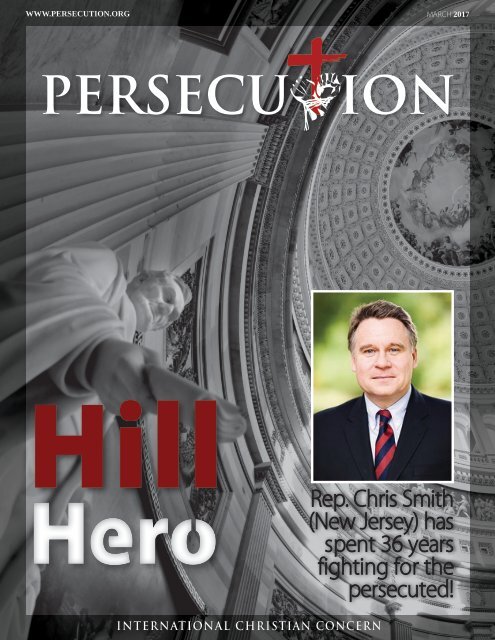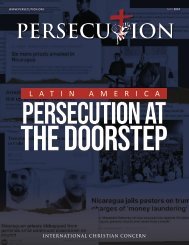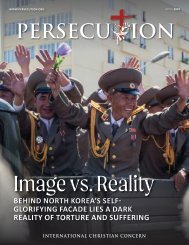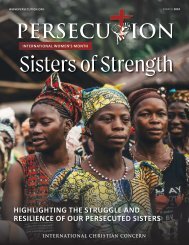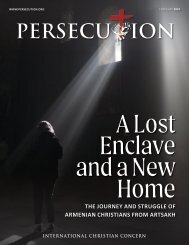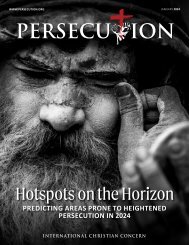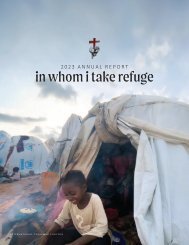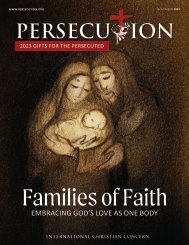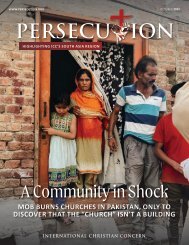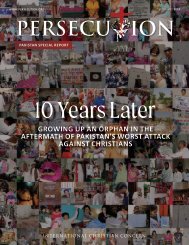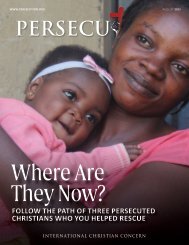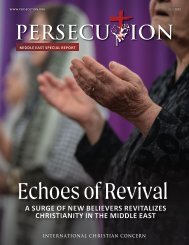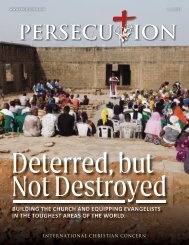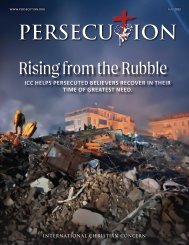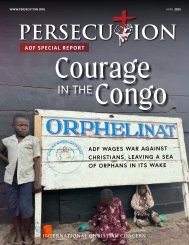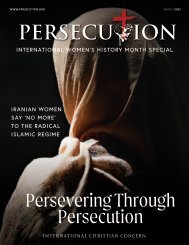March 2017 Persecution Magazine (4 of 5)
Create successful ePaper yourself
Turn your PDF publications into a flip-book with our unique Google optimized e-Paper software.
WWW.PERSECUTION.ORG<br />
MARCH <strong>2017</strong><br />
PERSECU ION<br />
Hill<br />
Hero<br />
Rep. Chris Smith<br />
(New Jersey) has<br />
spent 36 years<br />
fighting for the<br />
persecuted!<br />
PERSECU ION.org<br />
INTERNATIONAL CHRISTIAN CONCERN
Indonesia is a country with great<br />
ethnic and religious diversity. It is<br />
the world’s most populous Muslim<br />
nation. In fact, 90 percent <strong>of</strong> its<br />
250 million citizens are Muslim.<br />
At the constitutional level,<br />
Indonesia has created a framework<br />
guaranteeing freedom <strong>of</strong> religion<br />
for all government-recognized religions:<br />
Islam, Christianity, Hinduism,<br />
Buddhism, Confucianism, and Judaism. Followers<br />
<strong>of</strong> these religions, according to national laws,<br />
should be able to freely practice their religion.<br />
If you only examine the surface, you will come<br />
to the conclusion that Huffington Post did when<br />
it said that Indonesia practiced a more “liberal,<br />
pluralistic brand <strong>of</strong> Islam.”<br />
Go beyond the surface and look at recent<br />
history in Indonesia though, and you will not<br />
see a pluralistic society, but country that vigorously<br />
oppresses Christianity and other faiths,<br />
sometimes with extreme violence.<br />
A growing movement <strong>of</strong> radical Islam<br />
is exerting more and more influence in<br />
Indonesian affairs, including politics. Such<br />
entanglement has not only empowered the<br />
spread <strong>of</strong> extremism but has increased attacks<br />
and the suppression <strong>of</strong> religious minorities.<br />
The Setara Institute for Democracy and<br />
Peace in Indonesia recorded a 33% increase<br />
in cases <strong>of</strong> religious violence between 2014<br />
and 2015. They also noted that in 2016,<br />
Indonesia’s freedom level fell to a new low<br />
with “more rights violations committed by<br />
the government and local administrations.” A<br />
report by Indonesia’s National Commission on<br />
Human Rights (Komnas HAM) found that the<br />
most frequent violators <strong>of</strong> religious freedom<br />
are regional administrations, and that the number<br />
<strong>of</strong> complaints being filed against them are<br />
rapidly increasing.<br />
How is this happening in a democratic<br />
country that guarantees religious freedom?<br />
“Because,” as the Setara Institute argues,<br />
“no one dares draw a line and recognize<br />
Feature Article<br />
A Paradox <strong>of</strong><br />
Religious Freedom:<br />
Pastors Working Underground<br />
in a Religiously Free Society<br />
By Daniel Harris<br />
religiously-inspired incitement for what it is,<br />
let alone condemn it or take measures to stop<br />
it.” The absence <strong>of</strong> accountability in upholding<br />
religious freedom, especially by the government,<br />
destroys religious minorities while<br />
encouraging extremism’s spread.<br />
The coordinator for the faith freedom desk<br />
at the National Commission on Human Rights<br />
for Indonesia (Komisi Nasional Hak Asasi<br />
Manusia) said, “The three main factors fueling<br />
the violations [<strong>of</strong> religious freedom] are the low<br />
level <strong>of</strong> understanding <strong>of</strong> government <strong>of</strong>ficials<br />
about human rights principles, the inability <strong>of</strong><br />
regional leaders to deal with intolerant groups<br />
and the implementation <strong>of</strong> regional laws that<br />
<strong>of</strong>ten contradict higher laws.”<br />
Ahok and Religious<br />
Extremism in Action<br />
The recent case against Jakarta’s first<br />
Christian governor is a perfect example <strong>of</strong> this.<br />
Basuki Tjahaja Purnama, popularly known as<br />
Ahok, became the governor <strong>of</strong> Jakarta when<br />
Joko Widodo left the <strong>of</strong>fice to run for president<br />
in 2014. It was a significant step for Indonesia.<br />
Ahok is an ethnic Chinese and a Christian. His<br />
term would stand as a litmus test for religious<br />
and racial tolerance in Indonesia.<br />
Immediately, hardline Muslim organizations<br />
such as The Islamic Defenders Front<br />
(FPI) demanded his removal from <strong>of</strong>fice. They<br />
insisted that a Christian could never govern<br />
Muslims. But Ahok was popular with the<br />
people as he worked hard to tackle corruption<br />
and Jakarta’s crippling traffic problems. He<br />
should have easily won his bid for re-election<br />
this year, but one short statement taken out<br />
<strong>of</strong> context stifled his victory. During one<br />
campaign speech, Ahok challenged voters to<br />
vote their conscience and not allow Muslim<br />
leaders to scare them into voting for a Muslim<br />
by using particular verses from the Quran.<br />
Anti-Ahok Muslim groups edited his statement<br />
so it appeared that Ahok condemned the<br />
Quran itself rather than political manipulators.<br />
That video led to hundreds <strong>of</strong> thousands <strong>of</strong><br />
protesters flooding Jakarta’s streets, calling for<br />
Ahok’s imprisonment and even death.<br />
Ahok is now on trial for “blasphemy.” The<br />
sentence carries a five year prison term and<br />
few are ever acquitted.<br />
Rather than support a fair investigation,<br />
the government <strong>of</strong>fered little assistance to<br />
Ahok. The president barely acknowledged<br />
the 200,000+ person protests shutting down<br />
the capital. The police blatantly supported the<br />
Muslim crowds by supplying them with water,<br />
a stage, and a sound system. In Ahok’s trial,<br />
few cared that most <strong>of</strong> the “witnesses” were<br />
not even present for Ahok’s speech.<br />
The Setara Institute, a non-governmental<br />
organization that conducts research and<br />
advocacy on democracy, political freedom,<br />
and human rights in Indonesia, summed up<br />
Indonesia’s imagined religious freedom versus<br />
the unfortunate reality: “Indonesia’s spineless<br />
political leaders have allowed extremists to<br />
seize the momentum and foment religious<br />
hatred against the governor – who happens to<br />
be an ethnic Chinese Christian – for more than<br />
a month without challenging the substance or<br />
methods <strong>of</strong> their arguments.”<br />
Technically, blasphemy laws apply to all<br />
<strong>of</strong> Indonesia’s protected religions. The issue<br />
is not the absence <strong>of</strong> laws regarding religion,<br />
but that those laws are disproportionately used<br />
against Christians. In Ahok’s case, the leader<br />
<strong>of</strong> the organization that launched the protests<br />
demanding Ahok’s imprisonment openly<br />
mocked Christianity during several <strong>of</strong> his<br />
speeches. His speeches insulted Christianity<br />
so much that even Muslims are calling for his<br />
trial on the charge <strong>of</strong> blasphemy. The government<br />
has yet to press charges.<br />
The political tension has spilled into the<br />
public sphere, stressing an already tenuous<br />
relationship between Muslim Indonesians and<br />
ethnic or religious minorities. Many Christians<br />
are afraid for both their religious freedom and<br />
their lives. They should be.<br />
Jihad<br />
Ahok’s case and the lack <strong>of</strong> government<br />
protection is not a new story in Indonesia. The<br />
Saudis and Gulf states starting pouring money<br />
into Indonesia in the 1970s to radicalize the<br />
country’s Muslims. Their efforts came to fruition<br />
around 1998 when the country’s Muslims<br />
went on a massive jihad against Christians.<br />
From 1998 to 2003, Christians suffered greatly<br />
as their churches and homes were burned to the<br />
ground and they were raped and murdered.<br />
2 PERSECU ION.org<br />
MARCH <strong>2017</strong><br />
INTERNATIONAL CHRISTIAN CONCERN
Two large churches in<br />
Indonesia had their buildings<br />
shut down by local government<br />
<strong>of</strong>ficials. They now gather outside<br />
the presidential palace and hold<br />
their services in an act <strong>of</strong> protest.<br />
Although the government did not launch<br />
an <strong>of</strong>ficial investigation, an un<strong>of</strong>ficial report<br />
found that 2,244 people (both protesters and<br />
Christians) died, 168 were raped, and 1,604<br />
shops were destroyed. These statistics were<br />
only in Jakarta, however. The violence spread<br />
to other parts <strong>of</strong> the nation, including Java,<br />
Sulawesi, and Maluku and lasted until around<br />
2004. ICC has heard reports that as many as<br />
10,000 Christians actually died and approximately<br />
1,000 churches were burned down<br />
across the nation.<br />
That period <strong>of</strong> extreme anti-Christian violence<br />
is especially relevant today because it<br />
underlines the government’s lax stance against<br />
extremism. Shortly before the outbreak <strong>of</strong> violence<br />
in 1998, Human Rights Watch stated,<br />
“Not only have [government <strong>of</strong>ficials]<br />
expressed no sympathy for the victims or made<br />
any effort to explain to the public the causes<br />
and consequences <strong>of</strong> the economic crisis, but in<br />
some cases, they have tried to deflect blame for<br />
the economic crisis onto prominent members <strong>of</strong><br />
the ethnic Chinese community.”<br />
Recalling the political climate <strong>of</strong> 1998,<br />
The Economist noted, “At best, Ahok’s persecution<br />
represents a blow to the rights <strong>of</strong> all<br />
Indonesian minorities...At worst, the risk <strong>of</strong><br />
communal bloodshed like that <strong>of</strong> two decades<br />
ago is closer.”<br />
So What?<br />
Since then, the increasing trend <strong>of</strong> Islamic<br />
extremism threatening both religious and ethnic<br />
minorities has sent many Christian pastors<br />
underground, an irony in a country proud <strong>of</strong> its<br />
religious diversity.<br />
Islamic radicalism seems to be on the rise<br />
PERSECU ION.org<br />
INTERNATIONAL CHRISTIAN CONCERN<br />
in Indonesia. Cases <strong>of</strong> violence and persecution<br />
against Christians are increasing and the<br />
government appears ill-prepared or unwilling<br />
to uphold basic religious freedoms. This is a<br />
deadly combination driving Christian pastors<br />
underground. ICC asked several pastors why<br />
they are working underground in a country<br />
that guarantees freedom <strong>of</strong> religion. One pastor<br />
responded, “Freedom <strong>of</strong> religion? Yes, but it is<br />
only in theory. In practice, it [doesn’t exist].”<br />
The pastors shared that in the last few<br />
months, radical Muslims have bombed a<br />
Christian church and forced Christians to<br />
abandon their places <strong>of</strong> worship. The government<br />
did little to stop the radical groups. In<br />
fact, in some cases they have helped them. At<br />
a Christmas service in Bandung, for example,<br />
the government positioned police <strong>of</strong>ficers<br />
outside <strong>of</strong> a church to protect congregants<br />
from radical Muslims. Instead, the <strong>of</strong>ficers<br />
helped the Muslims chase away the Christian<br />
participants. In Aceh Province in October<br />
2015, an angry mob destroyed three churches<br />
after which the local government destroyed<br />
seven more.<br />
The government justifies destroying churches<br />
because they contend that the churches do<br />
not have the correct licenses. Procuring the<br />
correct licenses at the local level in Indonesia<br />
is a complicated process requiring scores<br />
<strong>of</strong> signatures from community leaders and<br />
government <strong>of</strong>ficials. The process is so complicated,<br />
according to unconfirmed reports<br />
received by ICC, that most religious institutions<br />
do not have the correct licenses, including<br />
mosques. This means that some members<br />
<strong>of</strong> radical Islamic groups that destroy unlicensed<br />
churches are probably members <strong>of</strong> an<br />
unlicensed institution themselves.<br />
Double standards as evidenced by licensing<br />
have led pastors to determine that they are<br />
not protected by the law, because extremists<br />
are allowed to operate freely outside the law.<br />
Openly practicing one’s faith can mean death.<br />
As one pastor told ICC, “The reason why I<br />
reach out underground is more for the safety<br />
<strong>of</strong> the converts. If I do it openly I will not only<br />
endanger the lives <strong>of</strong> these people but also the<br />
ministry and the ministers themselves.”<br />
Speaking Out<br />
Despite the government’s silence, some<br />
groups are boldly asserting the importance<br />
<strong>of</strong> religious freedom. During Christmas, a<br />
dangerous time for Christians in Indonesia,<br />
the largest Muslim organization in Indonesia,<br />
Nahdlatul Ulama (NU), pledged to help protect<br />
Christians as they attended Christmas Eve<br />
services. Christians need moderate Muslims<br />
like NU to make their voices heard over the<br />
growing rhetoric <strong>of</strong> radicalism and the government’s<br />
reluctance to protect religious freedom.<br />
One pastor told ICC, “My fear is that moderate<br />
Muslims will keep silent and thus give<br />
more room for the radicals to grow. My fear is<br />
that, in the end, the government will oblige the<br />
radical’s demand, leading Indonesia in a different<br />
direction.” When moderates remain silent,<br />
minorities must hide their beliefs in exchange<br />
for their safety. Indonesian Christians hope for<br />
the support <strong>of</strong> moderate Muslims to protect<br />
them from religious extremism and a stagnant<br />
government. An irony indeed.<br />
ICC supports underground pastors like<br />
these in Indonesia who are risking their lives<br />
to share the Gospel.<br />
3
Feature Article<br />
Christian <strong>Persecution</strong> in Vietnam:<br />
A church gathers<br />
for service in rural<br />
Vietnam. Montagnard<br />
Christians have faced<br />
more persecution than<br />
many other Christians<br />
groups in the country.<br />
“Just last month, they murdered my<br />
father in order to arrest me because<br />
they believe that I will return to<br />
Vietnam to attend my father’s funeral.<br />
I was supposed to return because I<br />
loved my father deeply. But for my<br />
safety my mother asked me not to<br />
return. I was so scared <strong>of</strong> returning<br />
home even though I really wanted to.”<br />
By Daniel Harris<br />
This tragic story belongs to<br />
a Montagnard Christian from<br />
Vietnam who fled the country<br />
to escape government agents<br />
seeking to arrest him for his<br />
Christian activities. When he<br />
escaped their grasp, they murdered<br />
his father, hoping he would return for the<br />
funeral so that they could arrest him.<br />
Montagnard Christians are the forgotten<br />
heroes and victims <strong>of</strong> a failed war. Also<br />
known as the Dega/Degar, they are a predominantly<br />
Christian ethnic group that lives<br />
in the highlands <strong>of</strong> Vietnam, Cambodia,<br />
and Laos. When US troops were fighting in<br />
4 PERSECU ION.org<br />
MARCH <strong>2017</strong><br />
INTERNATIONAL CHRISTIAN CONCERN
Feature Article<br />
Montagnard Victim Testimonies<br />
Vietnam, Montagnards fought<br />
alongside them and subsequently,<br />
many <strong>of</strong> them converted to<br />
Christianity. Now they are hunted<br />
like animals by their own<br />
communist government.<br />
Christians, such as the one<br />
quoted above, are forced to flee<br />
their homes to escape Vietnamese<br />
government agents who track<br />
them down for interrogation and<br />
execution.<br />
Desperate to suppress the<br />
Montagnard people, nothing<br />
has been out <strong>of</strong> bounds for the<br />
Vietnamese authorities. They<br />
have used illegal arrests and<br />
detainment, brutal torture, rape,<br />
and even murder. There are even<br />
reports <strong>of</strong> forced sterilization<br />
campaigns.<br />
One example <strong>of</strong> persecution<br />
includes an extensive campaign<br />
to shut down churches among<br />
Montagnard communities. In<br />
2015, Human Rights Watch<br />
reported, “Official Vietnamese<br />
media makes it clear that such<br />
government actions are part <strong>of</strong><br />
a high-level policy to eliminate<br />
‘evil way’ religions such as De<br />
Ga Protestantism and Ha Mon<br />
Catholicism practiced by some<br />
ethnic Montagnards…”<br />
Official state media has reported<br />
waves <strong>of</strong> “search and hunt”<br />
operations designed to “deal seriously”<br />
with core religious leaders.<br />
There are reports <strong>of</strong> public<br />
forced recantations in which<br />
hundreds <strong>of</strong> Montagnards were<br />
forced to recant their faith in<br />
front <strong>of</strong> fellow villagers. “Mobile<br />
trials” are held in Montagnard<br />
villages to convict and imprison<br />
followers <strong>of</strong> Christianity. Many<br />
Montagnards report experiencing<br />
torture because <strong>of</strong> their faith. A<br />
recent report describes one pastor’s<br />
martyrdom:<br />
“Around 7:30 a.m., the public<br />
security agents came to Pastor<br />
PERSECU ION.org<br />
INTERNATIONAL CHRISTIAN CONCERN<br />
“His death resulted from the multiple injuries<br />
inflicted by the beatings which came as a result <strong>of</strong><br />
his refusal to give up his faith.”<br />
A Christians<br />
processional<br />
moves through the<br />
streets <strong>of</strong> Vietnam.<br />
A choir sings<br />
during a church<br />
service in Vietnam.<br />
Thanh’s (name changed for security)<br />
house and ordered him to<br />
report for investigation. Pastor<br />
Thanh was interviewed for the<br />
whole day on the [practice <strong>of</strong><br />
Christianity] in his village.<br />
The interrogation [was focused<br />
on convincing him to give up<br />
Christianity].”<br />
“[On his refusal], the secret<br />
police got mad … and used various<br />
tools to beat him up. They<br />
beat him in the ribs, chest, and his<br />
abdomen. They also slapped his<br />
face and [repeatedly punched] his<br />
head. Consequently, he felt pain<br />
while breathing and he got seriously<br />
sick due to internal injuries.<br />
While they were beating him, he<br />
fell unconscious.”<br />
“He passed away around 9:30<br />
a.m. (two weeks after his detention)<br />
in 2016. His death resulted<br />
from the multiple injuries inflicted<br />
by the beatings which [came as<br />
a result <strong>of</strong> his] refusal to [give up<br />
his faith].”<br />
Secrecy is the greatest asset <strong>of</strong><br />
Vietnam’s secret police. When<br />
their activities are recorded and<br />
broadcast to the world, they <strong>of</strong>ten<br />
withdraw. For that reason, ICC is<br />
involved with training Vietnamese<br />
community members how to<br />
record and report cases <strong>of</strong> persecution<br />
to government and human<br />
rights agencies.<br />
Reports, like the one above that<br />
came from this project, expose<br />
Vietnam’s relentless and violent<br />
persecution <strong>of</strong> Montagnard<br />
Christians and gives them a<br />
way to defend themselves and a<br />
chance to finally end decades <strong>of</strong><br />
brutal persecution.<br />
5
You Can Help Today!<br />
PERSECU ION.org<br />
INTERNATIONAL CHRISTIAN CONCERN<br />
SEND DONATIONS TO:<br />
ICC<br />
PO BOX 8056<br />
SILVER SPRING, MD 20907<br />
OR ONLINE AT<br />
WWW.PERSECUTION.ORG<br />
OR BY PHONE<br />
800-ICC-5441<br />
GIVING TO ICC VIA<br />
YOUR WILL<br />
Provide now for a future gift to ICC<br />
by including a bequest provision in<br />
your will or revocable trust. If you<br />
would like more information on giving<br />
to ICC in this way, please give<br />
us a call at 1-800-ICC-5441.<br />
Kot Radha Kishan has become<br />
infamous in Pakistan as the scene <strong>of</strong><br />
one <strong>of</strong> the country’s most brutal and<br />
shocking instances <strong>of</strong> persecution<br />
— a couple beaten and burned alive<br />
at the city’s brick kiln by a mob <strong>of</strong><br />
thousands.<br />
© Copyright <strong>2017</strong> ICC, Washington, D.C., USA.<br />
All rights reserved. Permission to reproduce all<br />
or part <strong>of</strong> this publication is granted provided<br />
attribution is given to ICC as the source.<br />
International Christian Concern (ICC) is a nonpr<strong>of</strong>it 501(c)(3) (all donations tax-deductible).<br />
ICC makes every effort to honor donor wishes in regards to gifts. Occasionally, situations<br />
arise where a project is no longer viable. ICC will then redirect those donated funds to the<br />
fund most similar to the donor’s original wishes. ICC uses 7.5 percent <strong>of</strong> each restricted<br />
donation to carry out the mission <strong>of</strong> its segregated funds.<br />
facebook.com/persecuted<br />
@persecutionnews


